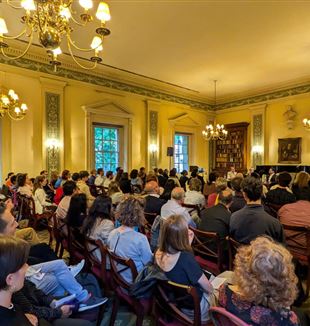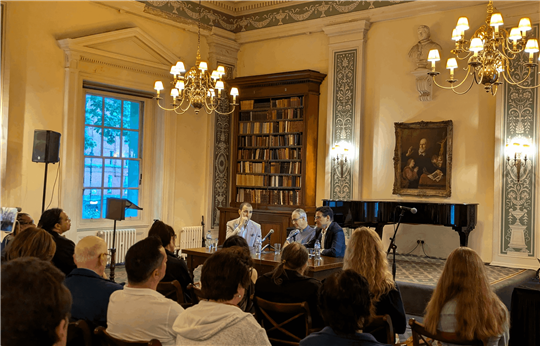
“What is mortal man that You care for him?”
A dialogue in London on human dignity and the meaning on suffering with John Shenuda, Paolo Carozza, and Vincent Nagle.“What is mortal man that You care for him?” This was the title of a dialogue about human dignity and the meaning of suffering that took place in London on Monday, 3 June, 2024.
A few months ago, a group of friends from the John Henry Newman Cultural Centre began to organise a meeting in London to discuss a subject that touches on the meaning of life and suffering in the context of recent media attention in the UK concerning the legalisation of Assisted Dying and Euthanasia.
At the very beginning, some of us were not convinced about organising an event about such a delicate topic, since we had never been confronted by this issue, or it was difficult to talk about. We pushed it aside without much interest, as happens with many of life’s issues. A friend of ours suggested that we work on the topic and we decided to go along with the consciousness that following friends is always a good thing for our lives. Some intense months of work followed, and unexpected encounters that have thrown us into reality in a bigger way than we could have imagined. Looking together at the beauty in everything around us and at this subject concretely, everything can become attractive and interesting.
We invited three speakers (who we can now call friends): John Shenuda, an anaesthetic doctor and member of The Royal College of Anaesthetists Ethics Committee; Vincent Nagle, a priest of the Fraternity of Saint Charles Borromeo and Chaplain of the Maddalena Grassi Foundation in Italy; and Paolo Carozza, Professor of Law and Political Science at Notre Dame University, USA.
We had a huge desire for this to be a missionary act, open to everyone, as we believe that the human heart is made in such a way that we can all recognise the truth. We wanted to make a radical proposal to the world that on the one hand is full of relativism, but on the other hand is hungry for a true judgement.
During the event, John introduced us to the context in the UK, clarifying medical terminology, and explaining the different attempts to change the law and the consequences for us and the medical sector. He specifically pointed out how the move from the original terminology ‘assisted suicide’ to the currently used ‘assisted dying’ has made controversial actions more acceptable. He mentioned, however, that doctors are debating this subject internally and how extremely important it is these days. John also moderated the dialogue by asking to Vincent and Paolo questions, to help us delve deeper into the topic.
From the beginning, Paolo placed these questions at the centre of the discussion: What is human dignity? What is the value of a human being? He explained to us the universality of dignity, something that we cannot lose because we exist, and we are human beings regardless of our condition. He went on to talk about the implications for Human Rights if we deny dignity under certain circumstances: if we imply that dignity depends on a social status, health conditions, levels of dependency on other people to sustain one’s life, then we automatically imply that it is not possible to guarantee Human Rights. Paolo explained the impacts of legislation and the danger of introducing degrees of dignity into law. He highlighted an important aspect: the law follows shifts in culture, from an experience and understanding of the value of human beings that comes from an education and culture. The law only works to serve the common good if cultural support for the law exists. 
Vincent, with his experience of working with terminally ill patients, shared with us examples of what he lives at the Maddalena Grassi Foundation as a Chaplain (hosting thousands of severely ill people with no prospect of recovery). He said that, in his vast experience, what is at the heart of people’s decision to end their own life is a matter of fear, of perceiving life as an unbearable misery. He shared that what has consistently brought change in his patients’ experience was a companionship: “Companionship changes everything. When someone perceives they are not alone, it changes everything.”
Vincent helped us to understand that companionship does not just mean being there for these patients, but looking at everything with them, with the strong consciousness that life is worth living in their current state. He always asks: “Where are You? Show me, where are You?” What always happens is that they discover something, together with the friends he is accompanying in the Mystery of Life. He spoke of how he is also afraid, but when he meets the patients and asks ‘Show me, where are You?”, God always happens: “Do you see that?” And they look together. They discover together and verify together. You need someone with you; you need someone to tell you, “Did you see that?”. “You are the most changed when you accompany someone suffering, not only the patient, but you!”
We need to help each other to look closely and to awaken the deep questions of meaning that are dormant, or that we do not want to ask ourselves. As Paolo mentioned at the end of the meeting, the only way we can change this is by bearing witness, then culture will follow, and the law will follow culture.
The John Henry Newman Cultural Centre